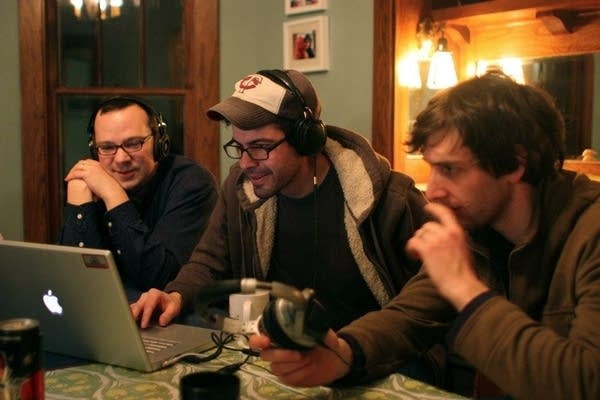The Counterfactuals: “Prof rock” takes the prairie by storm

April 02, 2014
As many college students will tell you, being invited to a professor’s house is a unique and exciting experience. For a Carleton College student to be invited, therefore, to the house of philosophy professor Dan Groll—frontman of the Counterfactuals—was a special treat.
After somewhat awkwardly letting myself in, I followed my ears down to his basement where the band was rehearsing. In many ways the space was unexceptional: your typical midwest basement with cement floors, cinderblock walls, and exposed pipes on the ceiling—a home for all the odds and ends that didn’t live upstairs. But then there was the impressive array of Fender amps, cables, and the large drum kit all arranged on a small square of carpet upon which the critically-acclaimed group was rehearsing a new single and preparing for their album release show.
For Groll, this success has been a long time coming. After earning an undergraduate degree in jazz performance on drums, he found himself in Chicago, attending grad school for philosophy and with few opportunities to play. “I really wanted to have an instrument that I could play by myself in my apartment,” he remembered. “So I picked up the guitar in like…2006? And just started, you know, learning the basic chords.” It was around that time that he began songwriting and founded the first Counterfactuals group—a four-piece outfit featuring cello instead of bass. It wasn’t until he got to Carleton, however, that things began to take off.
Jason Decker, a guitarist and also a Carleton philosophy professor, was the first to get on board in 2010, playing with Groll and with several different professors before St. Olaf philosophy prof Mike Fuerstein joined on drums and eventually Andy Flory—a member of Carleton's music faculty—came on as bassist in 2012. “Basically, I cornered the members and said, ‘You should play in the band,’” Groll said, laughing, “and they were like, ‘Okay!'"
All of the other members were clearly equally passionate about music. Like Groll, Mike Fuerstein had earned an undergraduate degree in jazz performance on saxophone, and bassist Andy Flory was a music professor who had helped reissue several seminal Motown records. Decker, in turn, had been playing guitar since middle school and would go on to create mixing equipment, manufacture sound effects, and master the whole album.
Despite their enthusiasm, however, the learning curve was pretty steep. Three of the four group members were playing new instruments, and Decker’s effects were a complete experiment. “It took a little while for us to get to the point where it was like, 'Okay, we can do this,' because we were rehearsing so infrequently, and don’t play that often," Groll acknowledged. “I’m much better, but initially playing guitar I was always fighting the instrument. But now I think we’ve all passed the point where it’s like, ‘Oh! I can’t really do this thing,’ to 'Okay, now I can kinda do what I wanna do,' and now we’re learning new skills and that’s a lot of fun.”
While the group’s newness to their instruments could have deterred them, it ultimately turned out to be a strength, and drastically shaped Groll’s songwriting technique. “One thing that it meant is that the melody had better be pretty compelling, because the guitar itself is not going to be very compelling,” he said. “Some people can play beautiful finger-style guitar while singing the melody, and I can’t do that, so the choice of chords, and the rhythm, and the melody better be interesting.”
With appropriately professorial attention to detail, the band members have been merciless in holding themselves to a high standard in rehearsal and recording: repeating passages if there's even a minute mistake and correcting each other, while also joking about their classes and swapping stories about their wives and kids. At the rehearsal I attended, there were also some unabashedly nerdy moments: jokes about Rodney Dangerfield and guitarist/engineer Decker’s delight at making “space sounds.”
[bandcamp width=350 height=470 album=1189571308 size=large bgcol=ffffff linkcol=0687f5 tracklist=false]
For these guys, creating successful music is only half of the fun; they also genuinely enjoy hanging out and playing with each other. “It helps that we’re all in that [academic] world, so we understand the pressures,” Groll said. “Both colleges encourage their faculty to have a healthy work-life balance, and I feel like we’re all able to take care of what we need to take care of professionally in a way—not just meeting the bare minimum, but actually devoting the time to that that needs to be devoted to it and that we want to devote to it, while still being able to carve out time to do this, which is really nice.”
True to indie music tradition, the Counterfactuals' debut Minimally Decent People was recorded and engineered all over the map: everywhere from Groll’s former basement to Flory’s office to Carleton’s small recording booth. A sophomore release is already in the works. “I think slash hope the plan is to start recording this summer,” Groll said. The group has begun rehearsing new songs, all featuring Groll’s characteristically strong melodies and witty lyrics.
The band's name itself is an academic in-joke: in logic, a "counterfactual" is an if-then argument describing a situation that would exist if a particular causal factor differed from reality. For example: if the Counterfactuals had never come together, then the world might never know just how hard philosophers can rock.
Mallory Guinee is a blogger, a harpist, and a French major at Carleton College. She loves traveling, long chats over tea, and listening to great music while lying on the living room floor.

